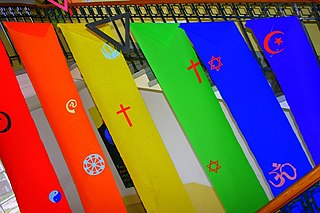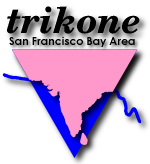
In the Indian subcontinent, hijra are transgender, intersex, or eunuch people who live in communities that follow a kinship system known as the guru-chela system. They are also known as aravani and aruvani, and in Pakistan, khawaja sira.
Hindu views of homosexuality and LGBTQ issues more generally are diverse, and different Hindu groups have distinct views. Hinduism describes a third gender that is equal to other genders and documentation of the third gender are found in ancient Hindu and Buddhist medical texts. The Kamasutra mentions Hijras and relations with them, and there are several Hindu temples which have carvings that depict both men and women engaging in sexual acts with Hijras. There are numerous cases of Hindu deities and figures that had physically transformed to different genders.
Homosexuality in India is socially permitted by most of the traditional native philosophies of the nation, and legal rights continue to be advanced in mainstream politics and regional politics. Homosexual cohabitation is also legally permitted and comes with some legal protections and rights.

Lesbian, gay, bisexual, transgender and queer (LGBTQ+)-affirming religious groups are religious groups that welcome LGBT people as their members, do not consider homosexuality as a sin or negative, and affirm LGBT rights and relationships. They include entire religious denominations, as well as individual congregations and places of worship. Some groups are mainly composed of non-LGBTQ+ members and they also have specific programs to welcome LGBTQ+ people into them, while other groups are mainly composed of LGBTQ+ members.

Lesbian, gay, bisexual, transgender, and queer (LGBTQ) rights in India have expanded in the 21st century, though much of India's advancements on LGBT rights have come from the judiciary and not the legislature. LGBTQ people in India continue to face legal and social challenges not experienced by non-LGBTQ people. There are no legal restrictions against gay sex within India. Same-sex couples have some limited cohabitation rights, colloquially known as live-in relationships. However, India does not currently provide for common-law marriage, same-sex marriage, civil union or unregistered cohabitation.

Lesbian, gay, bisexual, and transgender (LGBTQ) people in Bangladesh face widespread social and legal challenges not experienced by non-LGBT people.

Lesbian, gay, bisexual, and transgender (LGBTQ) rights in Nepal have expanded in the 21st century, though much of Nepal's advancements on LGBT rights have come from the judiciary and not the legislature. Same-sex sexual acts have been legal in Nepal since 2007 after a ruling by the Supreme Court of Nepal.

Trikone is a non-profit support, social, and political organization for South Asian bisexual, lesbian, gay, and transgender people. It was founded in 1986 in the San Francisco Bay Area and is one of the oldest groups of its kind in the world. South Asians affiliated with Trikone are from or trace their ancestry to the following countries: Afghanistan, Bangladesh, Bhutan, India, Maldives, Burma, Nepal, Pakistan, Sri Lanka, and Tibet. Trikone published an eponymous magazine with an international base of subscribers several times a year. The magazine was the oldest South Asian LGBT magazine in the U.S., and ran from 1986 to 2014.

Lesbian, gay, bisexual and transgender (LGBT) rights in Tamil Nadu are the most progressive among all states of India. Tamil Nadu was the first state in India to introduce a transgender welfare policy, wherein transgender individuals can access free gender affirmation surgery in government hospitals and various other benefits and rights. The state was also the first to ban forced sex-selective surgeries on intersex infants, and also the first state to include an amendment in its state police guidelines that expects officers to abstain from harassing the LGBTQIA+ community and its members. The state also became the first to ban conversion therapy as well as the first to introduce LGBTQIA+ issues in school curricula.

The relationship between religion and lesbian, gay, bisexual, transgender and queer (LGBTQ) people can vary greatly across time and place, within and between different religions and sects, and regarding different forms of homosexuality, bisexuality, non-binary, and transgender identities. More generally, the relationship between religion and sexuality ranges widely among and within them, from giving sex and sexuality a rather negative connotation to believing that sex is the highest expression of the divine.

LGBTQ people are well documented in various artworks and literary works of Ancient India, with evidence that homosexuality and transsexuality were accepted by the major dharmic religions. Hinduism and the various religions derived from it were not homophobic and evidence suggests that homosexuality thrived in ancient India until the medieval period. Hinduism describes a third gender that is equal to other genders and documentation of the third gender are found in ancient Hindu and Buddhist medical texts. The term "third gender" is sometimes viewed as a specifically South Asian term, and this third gender is also found throughout South Asia and East Asia.

India has a long and ancient tradition of culture associated with the LGBTQ community, with many aspects that differ markedly from modern liberal western culture.
Gaylaxy is an Indian lesbian, gay, bisexual and transgender (LGBT) magazine. The magazine is based in Kolkata.
This is a timeline of notable events in the history of non-heterosexual conforming people of Asian and Pacific Islander ancestry, who may identify as LGBTIQGNC, men who have sex with men, or related culturally-specific identities. This timeline includes events both in Asia and the Pacific Islands and in the global Asian and Pacific Islander diaspora, as the histories are very deeply linked. Please note: this is a very incomplete timeline, notably lacking LGBTQ-specific items from the 1800s to 1970s, and should not be used as a research resource until additional material is added.

The following outline offers an overview and guide to LGBTQ topics:
Shamakami was an early organization of South Asian lesbians and bisexual women based in the United States. They published a newsletter of the same name between June 1990 and February 1997.
Khush is a 1991 British short film directed by Pratibha Parmar. It portrays lesbians and gay men from India and other parts of Asia, discussing their coming out and their acceptance and embracing of their sexuality. Khush also discusses homosexuality in the Indian diaspora.
Khush: South Asian Lesbian and Gay Association was a queer collective activist organization in Canada geared towards South Asian men and women whose goal was to promote a better understanding of South Asian culture and values within the gay and lesbian community.

Lesbian, gay, bisexual and transgender (LGBT) people in Kerala face legal and social difficulties not experienced by non-LGBT persons. However, Kerala has been at the forefront of LGBT issues in India after Tamil Nadu. It became one of the first states in India to establish a welfare policy for the transgender community and in 2016, proposed implementing free gender affirmation surgery through government hospitals. Same-sex sexual activity has been legal since 2018, following the Supreme Court ruling in Navtej Singh Johar v. Union of India. In addition, numerous LGBT-related events have been held across Kerala, including in Kochi and Thiruvananthapuram. However, there is also increasing opposition to LGBT rights recently as evidenced by the anti-LGBT campaigns spearheaded by meninist groups and Muslim organisations like Indian Union Muslim League, Samastha and Jamaat-e-Islami.
The following list is a partially completed compilation of events considered to have a profound effect on the welfare or image of Tamil sexual minorities. The use of bold typeface indicates that the event is widely considered to be landmark:
 Earliest known records of South Asian MSM in North America, as Tara Singh and Jamil Singh are separately arrested for interracial sodomy in Sacramento, CA. [23]
Earliest known records of South Asian MSM in North America, as Tara Singh and Jamil Singh are separately arrested for interracial sodomy in Sacramento, CA. [23]  Rajendra Yadav, a leading Hindi novelist, publishes his story "Prateeksha" ("Waiting") that depicts a homosexual relation between two women without censure and in detail. [24]
Rajendra Yadav, a leading Hindi novelist, publishes his story "Prateeksha" ("Waiting") that depicts a homosexual relation between two women without censure and in detail. [24]  Bhupen Khakhar, a successful painter and writer of Gujarati fiction, and one of the few who is openly homosexual, writes an untitled story depicting bisexuality in a quotidian, lower middle-class context. [24]
Bhupen Khakhar, a successful painter and writer of Gujarati fiction, and one of the few who is openly homosexual, writes an untitled story depicting bisexuality in a quotidian, lower middle-class context. [24] 









